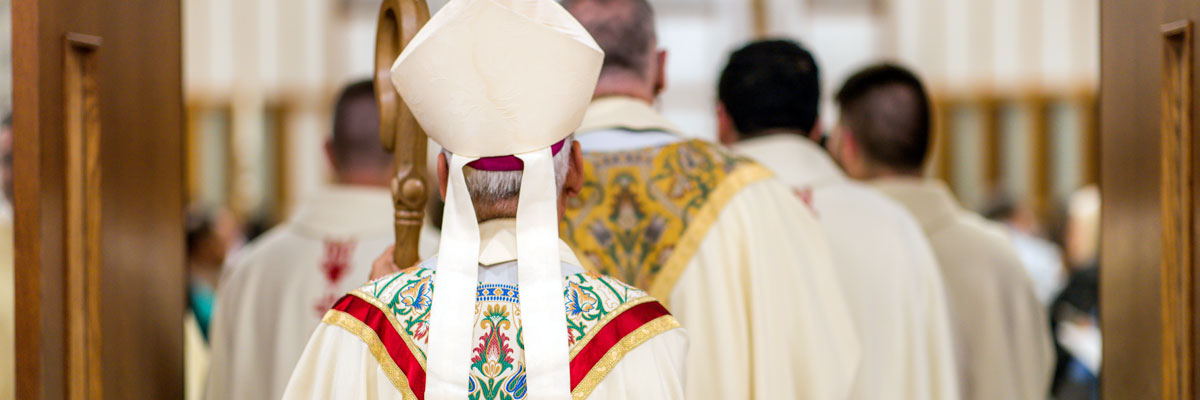Official Website of the
Catholic Diocese of Little Rock
Sixth Sunday in Ordinary Time, Year B
Published: February 10, 2018
Bishop Anthony B. Taylor preached the following homily at the Cathedral of St. Andrew in Little Rock on Saturday, Feb. 10, 2018, and at Sacred Heart Church in Morrilton and St. Mary of the Springs Church in Hot Springs on Sunday, Feb. 11, 2018.

Bishop Taylor
Gershon Tucker, president of my high school senior class, died 25 years ago of AIDS. He was the first person I knew to die of AIDS, so his struggle gave the disease a human face for me. In school he had been groundbreaking and popular. He was the first African American and possibly the first Catholic ever elected president of the Ponca City High School senior class.
He was courageous. One of his duties as class president was to escort the white homecoming queen and kiss her during halftime, which caused quite a bit of commotion in 1972. He was a talented dancer, went to New York and performed in several Broadway productions, including "Cats."
We figured he was probably gay, but we all liked him. He was a very kind person. But by 1993 he was in hospice care, a broken man for whom the stigma attached to AIDS made everything even worse. People who knew you couldn't catch AIDS through casual contact nevertheless stayed away because Gershon was now unclean.
When I gave him a hug, he automatically pulled back in emotional self-defense because he was so used to people being afraid to touch him. He had become a leper. Our parish church was full the day of his funeral, but very few of those present had ever visited his sick bed.
Some blamed him for his disease, even saw it as God's punishment for sin, but you know, once a person is down the only appropriate response is compassion. When I gave him a hug, he automatically pulled back in emotional self-defense because he was so used to people being afraid to touch him. He had become a leper. Our parish church was full the day of his funeral, but very few of those present had ever visited his sick bed.
There were many lepers in Jesus' time too and just like Gershon, many of them had once been well-liked. But with this illness, everything changed for them. They were now unclean and actually did have to be isolated because unlike AIDS, you really could catch leprosy through casual contact.
In today's Gospel one of these lepers broke quarantine and came to Jesus with an interestingly worded request. He didn't say, “cure me,” he said “make me clean,” because the stigma attached to leprosy made everything even worse.
Just as with AIDS, some people blamed the victims and even saw leprosy as God's punishment for sin. So when Jesus said, “I do will it, be clean,” he is referring as much to interior cleansing from sins as to exterior cleansing from disease. Moreover, the way Jesus makes this man clean is by touching him, despite the fact that in Jewish law, if you touch an unclean person you become unclean yourself.
Jesus cleanses this man by taking his uncleanness upon himself, much like on Calvary he will take away our sins by taking it on himself — allowing himself to be crucified for our sins.
But now notice what happens: Since Jesus touched the leper, he had now become temporarily unclean, and so our Gospel passage says that it was now “no longer possible for him to enter a town openly,” meaning in effect that Jesus now had to live the life of a leper for a little while — “outside the town, in deserted places” — until his own time of uncleanness had passed.
But unclean or not, today's Gospel emphasizes that people could tell that God was working through Jesus, so “they kept coming to him from everywhere.”
Our parish church from which Gershon was buried has a window depicting Father Damien the leper. Father Damien gave his life in service of the lepers whom our government had exiled for life on Molokai, a remote island in the middle of the Pacific Ocean.
Father Damien soon discovered that he could not really help these broken people unless he took on himself the risks involved in sharing their life. To clean their sores he had to touch them, to offer them comfort he had to hold them. Some people blamed him for the leprosy he eventually contracted — just like others blamed Jesus for going to Jerusalem to embrace a cross he could have avoided.
But if Jesus had been more prudent, we would not have been saved. And if Father Damien had been more prudent, the lepers of Molokai might never found the strength and hope that only love can give. How about us?
There are lots of lepers in today's world too, lots of unacceptable, unclean people whom we readily categorize and stigmatize. You don't have to have AIDS to be a leper today; it is enough to be homeless or mentally ill or have jail time in your past.
When was the last time you touched the heart of an unclean person offering them the strength and courage that only love can give?









